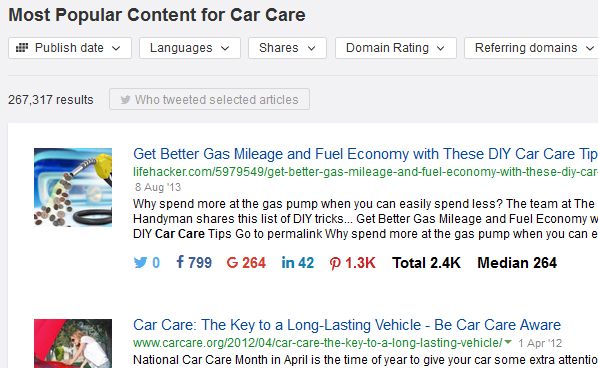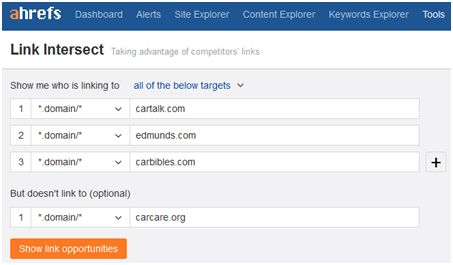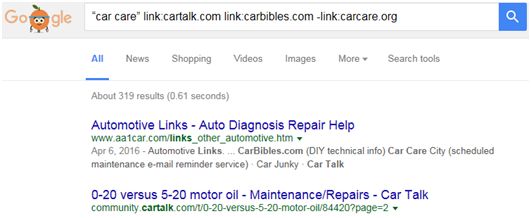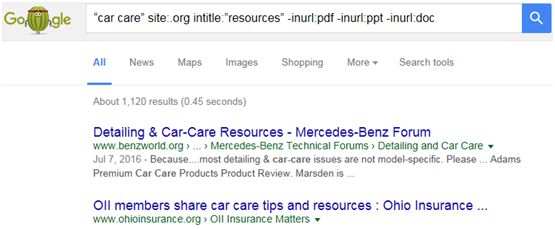Eric Enge, of Stone Temple Consulting, recently published a new study confirming that backlinks still matter. This research supports Andrey Lipattsev’s assertion that links are one of the top two search ranking factors. The key takeaway from the report is “When you aren’t facing page relevance or quality issues, links can, and do, continue to significantly impact rankings.”
Equally important, however, is the likelihood that links will continue to matter for a long time. Matt Cutts indicated as recently as May 2014 that “I think backlinks still have many, many years left in them.” I know from personal experience that just a few relevant high trust / high authority links can move the dial.
The Challenge
I think Michail Dimitriou’s skepticism, as expressed in his comment below, is shared by many

“Publish great content that is relevant to your target audience (and will naturally attract links).” Have you ever seen this (…) happen (not in theory, in reality) in the history of web for small businesses and without reciprocal link?
As someone who works with small to medium-sized businesses, I hear this all the time. The good news is that it is possible to attract relevant links, naturally, to a commercial website. No reciprocal link required. It boils down to having the right content, finding the right audience, and then reaching that audience.
The Approach
From my experience, the best approach for attracting relevant links is to develop a resource center on your website. It doesn’t require a sexy product or service – nearly any niche or vertical works. In addition to attracting links, this gives you the opportunity to build trust and authority.
With the advent of Panda, Penguin, Hummingbird, and Rankbrain, it should be pretty clear that Quality is King. Writing gobs of keyword stuffed nonsense won’t cut it. Your resource center needs to be well-organized and filled with useful content that is related to your business.
Following are some good examples of resource centers. Use these as a starting point for developing ideas for your own site. I have no affiliation with any of these websites:
- Annuity FYI: The center is filled with articles and guides covering a variety of retirement planning and annuity-related topics.
- Safewise: They created a “resource library” offering guides, tips and best practices for keeping homes and communities safe.
- Square One Insurance: Their impressive “Home and personal safety resource centre” provides tips on how to protect your family and home
- Car Care: The entire website is a resource center. Run by the non-profit Car Care Council it is probably the best example of all. It features a combination of content ranging from articles to guides to schedules and even how-to videos.
What Goes into a Resource Center?
The ideal content for a resource center is useful information. In many cases, the content will need to be developed by an expert. This isn’t a place to dump $3 outsourced SEO articles. This is where you provide real information that someone could find useful.
Start with a wireframe – the CarCare.org Example looks like this:

“Car Care Resources” focuses on
- Car Care Guide
- Vehicle Systems Overview
- Do It Yourself
- Car Care Tips
- Car Tips and Videos
“Car Care Service Schedules” focuses on
- Custom Service Schedule
- General Service Schedule
“Car Care Videos” focuses on
- How To Videos
- Informational Videos
Note: If this were a retail site, there might be an opportunity to mix in product videos, but keep in mind this is a resource center – not a sales center. The less “retail” the center is, the better the chance of attracting links from high trust / high authority websites.
“Go Green” focuses on
- Steps to a “Greener” Car
- The Aftermarket Green Story
- What’s new in Green for Cars
- Additional Articles in Green
“Events” promotes
- National Car Care Month in April
- Fall Car Care Month in October
“Industry Toolbox” focuses on
- Industry Resources
- Women’s Board
“Media”
- An aggregation of Press Releases republished on the website
This wireframe example could be modified to fit almost any business. Developing the wireframe is a fluid process. You may find that you need to modify it as you drill down for specific content ideas.
Drilling Down for Content Ideas
Look for content with a proven track record. Content that has demonstrated the ability to attract links from multiple sources. The fastest way to find that kind of content is through the use of a content discovery tool like BuzzSumo or ahrefs’ Content Explorer, as shown below:

When you find content that has several linking domains and good organic traffic, you have a winner. What constitutes “several” and “good” will vary by campaign – there is no set standard. Once you do your research, it should become apparent.
Finding an Audience
One might think that promoting content on social media is a good way to acquire links. According to a 2015 study by Moz & BuzzSumo, there is “NO overall correlation of shares and links, implying people share and link for different reasons.” Email outreach is still the best method for acquiring relevant and powerful links.
The first step for an email outreach campaign is to develop a list of targeted pages where you would like your link to appear.
Start your list building by mining the links pointing to the original content. The top three backlink tools are the Moz Open Site Explorer, Majestic Site Explorer and ahrefs Site Explorer. One can debate which is “best”, but any of the three will work.
![]()

Follow up by mining competitor backlinks, using a tool like the Moz Link Competition tool or ahref’s Link Intersect

Alternatively, you could run a Google search to find sites linking to your competitors, but not your site with the query “keyword” link:competitor1.com link:competitor2.com -link:yoursite.com

Keep in mind that Google only shows a small sample of links – less than you will find with 3rd party tools. That said, the quality of the links disclosed by Google is likely to be good.
Finally, use Advanced Search Operators to find resource pages on authority sites. Two of the best searches for resource discovery are:
- “keyword” site:.org intitle:”resources” -inurl:pdf -inurl:ppt -inurl:doc
- “keyword” site:.org intitle:”links” -inurl:pdf -inurl:ppt -inurl:doc

Email Outreach
The approach to email outreach is what separates the pros from the amateurs. If you want to succeed, the best email template to follow is none. There is no cookie cutter email template that will work for every link request. To improve your chances of getting a link from email outreach:
Prove that you are a human and not a robot – Don’t fall into the pattern of writing an email that emulates every spam link request that you have ever seen.
- Read and understand the website: Is there a real possibility of getting a link? If not, move on.
- Use a real email account: Not Gmail or another freebie to establish credibility
- Subject line: Some websites require a specific subject line when requesting a link. Follow the instructions. Otherwise, personalize the subject line
- Start your email by using the site owner’s name
Be specific with your request. Don’t make the webmaster think.
- Explain why you are contacting them
- Provide the URL that you would like to have a link from
- Give a compelling reason to link to your page
- For example: Check every resource page that you would like to have a link on for broken links. The compelling reason could be to fix a broken link on a page by using your resource as a replacement
- Provide the URL that you would like a link to
In short – show the webmaster that you have invested some time in understanding their website as an incentive for them to invest time and consideration for linking to your site.
Is it Worth the Effort?
Creating a good resource center, then performing outreach takes a lot of work. One positive is that you can launch a resource center as a work in progress. This form of content marketing is truly perpetual. Is it worth the effort? Once again, let’s take a look at CarCare.org:

Pretty awesome, but… does CarCare.org have an advantage in being a standalone, not for profit website? Probably so, as some schools, government agencies, and enterprise websites have a policy against linking to e-commerce sites. That said, if the CarCare.org content lived on a car parts website, I know from experience that it would perform exceptionally well in attracting links. As an added bonus, this type of content is appealing to Google’s quality algorithms.
This is what Google is referring to when they preach the gospel of “publish good content to get links.” These are the kinds of links that will stand the test of time. Even without the SEO benefit, these links are great to have as they can potentially drive massive amounts of highly relevant traffic to your website.
Image Credits
Featured Image: ArtsyBee/Pixabay.com
All screenshots by Chuck Price. Taken August 2016.




